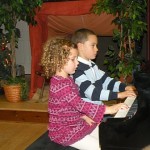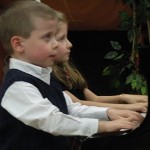Benefits of Music
Learning an instrument can provide the following benefits to students:

- build self-esteem
- evelop initiative
- provide outlet for creativity
- develop sense of responsibility for possession
- develop sense of responsibility for being well behaved
- develop sense of responsibility for making an honest effort
- prepare foundation for drama, dance, and other arts activities
- develop attention span and concentration level
- develop visual memory
- develop aural memory
- develop time-management and organizational skills
- develop goal-setting and task-completion skills
- develop problem-solving skills
- develop confidence in facing new situations and challenges
For pre-schoolers and kindergarteners, there are additional pre-academic skills and attitudes fostered by piano study in particular:

- develop small muscle skills (writing)
- develop differentiation between left and right (reading, writing, following directions)
- develop visual tracking (reading, writing, math)
- develop aural short-term memory (following directions)
- develop visual discrimination (reading, writing, math)
- develop aural discrimination (following directions)
- provide practice in sequencing letters and numbers (reading, writing, math)
As the student continues with music education, the following skills strengthen:
- Comprehending – Learning to perceive and derive meaning from musical sounds (for example, to identify a musical theme) sharpens your childs ability to comprehend abstractions.
- Solving Problems – The ability to understand a problem and reach an appropriate solution is one of the most important skills your child can learn. Learning the basics of musical language, such as harmony, or interpreting a work through performance teaches this skill.
- Reasoning Logically – Applying particular lessons to other problems and situations requires sound reasoning. When your child learns to analyse a musical work from a cultural, structural, or historical perspective, or to improvise within a certain musical style, both inductive and deductive reasoning grow stronger.

Ryan and Rebecca Nelsen - Making Value Judgements – Learning to comprehend, consider, and evaluate in music can help your child make informed decisions in other aspects of life. Discriminating between great and lesser works or justifying musical choices in compositions can teach your child independent thinking and how to make and uphold value judgements.
- Using Symbols – The ability to use symbols distinguishes the human race among all forms of life. Learning to read, write, and interpret musical notation provides access to a nonverbal world of thought and strengthens the use of other symbol systems as well, such as mathematics or language.
- Conceptualising – Your child learns to classify and generalize by learning to identify different types and styles of music, to recognize how different cultures use music for personal expression, and to recognize common elements in different works.
- Communication – Perhaps the greatest gift of music is its ability to cultivate our feelings and thoughts through nonverbal means. Being able to express theses feelings and thoughts, and to respond to them in others, is part of every successful program of music study and indispensable in your childs total development.
Research evidence for the benefits of music and music education

“Every student in the nation should have an education in the arts.” This is the opening statement of The Value and Quality of Arts Education: A Statement of Principles, a document from the nation’s ten most important educational organizations, including the American Association of School Administrators, the National Education Association, the National Parent Teacher Association, and the National School Boards Association… [more]

